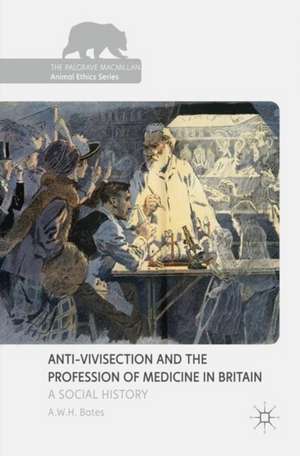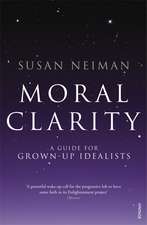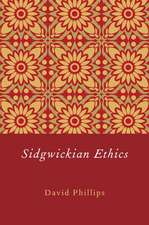Anti-Vivisection and the Profession of Medicine in Britain: A Social History: The Palgrave Macmillan Animal Ethics Series
Autor A.W.H. Batesen Limba Engleză Hardback – 3 aug 2017
This book is open access under a CC BY 4.0 license.
This book explores the social history of the anti-vivisection movement in Britain from its nineteenth-century beginnings until the 1960s. It discusses the ethical principles that inspired the movement and the socio-political background that explains its rise and fall. Opposition to vivisection began when medical practitioners complained it was contrary to the compassionate ethos of their profession. Christian anti-cruelty organizations took up the cause out of concern that callousness among the professional classes would have a demoralizing effect on the rest of society. As the nineteenth century drew to a close, the influence of transcendentalism, Eastern religions and the spiritual revival led new age social reformers to champion a more holistic approach to science, and dismiss reliance on vivisection as a materialistic oversimplification. In response, scientists claimed it was necessary to remainobjective and unemotional in order to perform the experiments necessary for medical progress.
Din seria The Palgrave Macmillan Animal Ethics Series
- 18%
 Preț: 786.52 lei
Preț: 786.52 lei - 8%
 Preț: 588.34 lei
Preț: 588.34 lei - 8%
 Preț: 538.07 lei
Preț: 538.07 lei - 20%
 Preț: 814.16 lei
Preț: 814.16 lei - 20%
 Preț: 691.10 lei
Preț: 691.10 lei - 17%
 Preț: 524.04 lei
Preț: 524.04 lei - 18%
 Preț: 1238.56 lei
Preț: 1238.56 lei - 18%
 Preț: 894.46 lei
Preț: 894.46 lei - 15%
 Preț: 648.24 lei
Preț: 648.24 lei -
 Preț: 384.86 lei
Preț: 384.86 lei - 15%
 Preț: 590.49 lei
Preț: 590.49 lei -
 Preț: 390.63 lei
Preț: 390.63 lei -
 Preț: 482.17 lei
Preț: 482.17 lei -
 Preț: 384.86 lei
Preț: 384.86 lei -
 Preț: 485.24 lei
Preț: 485.24 lei - 18%
 Preț: 883.75 lei
Preț: 883.75 lei - 18%
 Preț: 727.97 lei
Preț: 727.97 lei -
 Preț: 383.93 lei
Preț: 383.93 lei -
 Preț: 380.45 lei
Preț: 380.45 lei - 18%
 Preț: 737.12 lei
Preț: 737.12 lei - 15%
 Preț: 644.18 lei
Preț: 644.18 lei - 15%
 Preț: 698.15 lei
Preț: 698.15 lei -
 Preț: 385.84 lei
Preț: 385.84 lei - 18%
 Preț: 1111.53 lei
Preț: 1111.53 lei -
 Preț: 380.25 lei
Preț: 380.25 lei - 18%
 Preț: 780.82 lei
Preț: 780.82 lei - 15%
 Preț: 700.94 lei
Preț: 700.94 lei - 15%
 Preț: 639.73 lei
Preț: 639.73 lei - 15%
 Preț: 703.52 lei
Preț: 703.52 lei -
 Preț: 414.21 lei
Preț: 414.21 lei - 18%
 Preț: 787.47 lei
Preț: 787.47 lei - 18%
 Preț: 723.24 lei
Preț: 723.24 lei -
 Preț: 379.68 lei
Preț: 379.68 lei -
 Preț: 383.93 lei
Preț: 383.93 lei -
 Preț: 383.12 lei
Preț: 383.12 lei
Preț: 224.33 lei
Nou
Puncte Express: 336
Preț estimativ în valută:
42.93€ • 44.66$ • 35.44£
42.93€ • 44.66$ • 35.44£
Carte tipărită la comandă
Livrare economică 14-28 aprilie
Preluare comenzi: 021 569.72.76
Specificații
ISBN-13: 9781137556967
ISBN-10: 113755696X
Pagini: 192
Ilustrații: XXI, 217 p.
Dimensiuni: 148 x 210 x 23 mm
Greutate: 0.44 kg
Ediția:1st ed. 2017
Editura: Palgrave Macmillan UK
Colecția Palgrave Macmillan
Seria The Palgrave Macmillan Animal Ethics Series
Locul publicării:London, United Kingdom
ISBN-10: 113755696X
Pagini: 192
Ilustrații: XXI, 217 p.
Dimensiuni: 148 x 210 x 23 mm
Greutate: 0.44 kg
Ediția:1st ed. 2017
Editura: Palgrave Macmillan UK
Colecția Palgrave Macmillan
Seria The Palgrave Macmillan Animal Ethics Series
Locul publicării:London, United Kingdom
Cuprins
Introduction.- Chapter 1. Vivisection, virtue, and the law in the nineteenth century.- Chapter 2. Have animals souls?.-
Chapter 3. A new age for a new century.- Chapter 4. The National Anti-Vivisection Hospital, 1902–1935.- Chapter 5. The Research Defence Society.- Chapter 6. State control, bureaucracy, and the national interest from the Second World War to the 1960s.- Conclusion.
Notă biografică
A.W.H. Bates is a Coroner’s Pathologist, Honorary Senior Lecturer at University College London, and Fellow of the Oxford Centre for Animal Ethics, UK. His other books include Emblematic Monsters (2005) and The Anatomy of Robert Knox (2010).
Textul de pe ultima copertă
This book is open access under a CC BY 4.0 license.
This book explores the social history of the anti-vivisection movement in Britain from its nineteenth-century beginnings until the 1960s. It discusses the ethical principles that inspired the movement and the socio-political background that explains its rise and fall. Opposition to vivisection began when medical practitioners complained it was contrary to the compassionate ethos of their profession. Christian anti-cruelty organizations took up the cause out of concern that callousness among the professional classes would have a demoralizing effect on the rest of society. As the nineteenth century drew to a close, the influence of transcendentalism, Eastern religions and the spiritual revival led new age social reformers to champion a more holistic approach to science, and dismiss reliance on vivisection as a materialistic oversimplification. In response, scientists claimed it was necessary to remain objective and unemotional in order to perform the experiments necessary for medical progress.
Caracteristici
Offers a refreshingly objective viewpoint on the morality of animal vivisection Provides new insights into a much-studied field Takes a medicine-based approach to the broader issue of animal ethics Includes supplementary material: sn.pub/extras
















